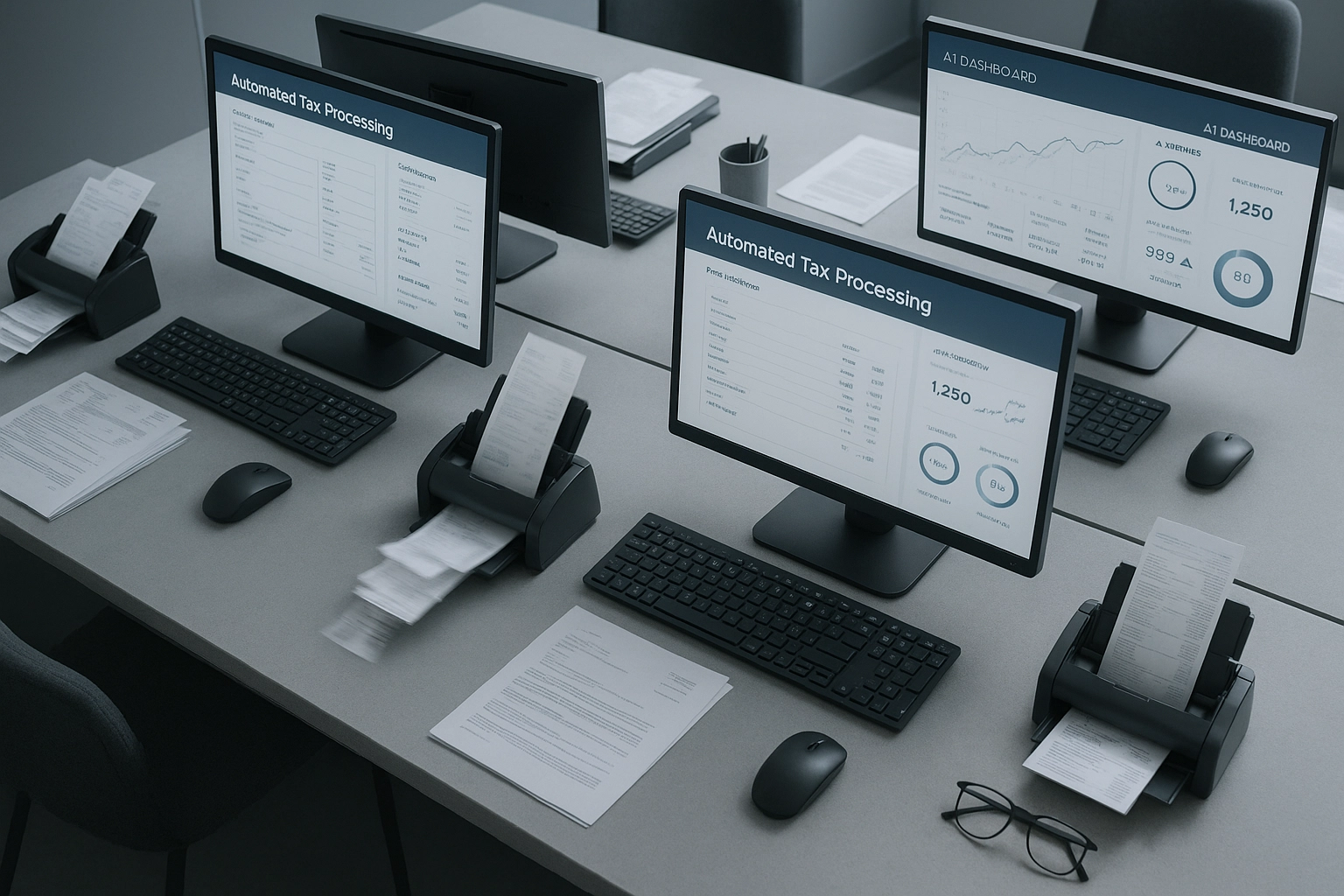AI Tax Planning Secrets Revealed: What CPAs Don't Want You to Know
- Sion Jajate

- Sep 9
- 5 min read
The integration of artificial intelligence into tax planning has created both opportunities and challenges that many CPAs aren't openly discussing with their clients. While AI promises greater efficiency and accuracy, there are several important realities about AI tax planning that deserve transparency.
Here at SJ Accounting Services, we believe in complete honesty about how technology is reshaping our industry—and what that means for you as our client.
The Accuracy Myth: AI Isn't Infallible
Despite marketing claims about AI's precision, the reality is more nuanced than most firms want to admit. Even sophisticated AI systems like ChatGPT are wrong approximately 5% of the time, yet they present their answers with unwavering confidence. This creates a dangerous scenario where both tax professionals and clients may blindly trust AI-generated advice without proper verification.
Think about it—if you're making critical financial decisions based on AI recommendations, that 5% error rate could cost you thousands in penalties, missed deductions, or incorrect filings. The average tax filer already has about a 20% chance of making mistakes in their filings, and over-reliance on AI without human oversight can compound these errors.

We've seen this firsthand when reviewing returns prepared by firms that rely too heavily on automated systems. Simple context that humans would catch—like distinguishing between business and personal expenses for home-based entrepreneurs—sometimes gets lost in translation. That's why our team uses AI as a powerful tool, but never as a replacement for experienced human judgment.
The Evolving Expertise Landscape
Here's something that might surprise you: many tax preparers are grappling with a fundamental shift in their profession that's actually leveling the playing field in unexpected ways. Recent major tax law changes, including the Tax Cuts and Jobs Act and the SECURE Act, have essentially reset the expertise clock for tax preparers.
What does this mean? Traditional expertise built over decades of experience with older tax codes has become less relevant when new rules dominate the landscape. Some tax professionals who once held deep knowledge of tax codes are now learning alongside AI systems, potentially diminishing their traditional competitive advantage.
The uncomfortable truth: Not all CPAs have adapted equally well to this shift. Some are struggling to keep up with both new tax laws AND new technology, while others are embracing the change to provide better service. This creates a significant quality gap in the industry that clients often don't realize exists.
Behind-the-Scenes Efficiency Gains You're Not Seeing
Tax preparers are experiencing significant operational benefits from AI that may not always translate to client savings or improved service. Let's be frank about what's happening behind closed doors:
AI tools can automatically extract, categorize, and process tax documents, dramatically reducing manual data entry and allowing accountants to focus on higher-value advisory services. This increased efficiency enables firms to manage larger client bases without proportionally increasing staff, potentially boosting profits while maintaining service levels.
Key AI capabilities transforming the industry:
Document scanning and data extraction in seconds
Automatic categorization of expenses and income
Real-time error detection and compliance checking
Instant generation of standard tax forms
Automated client communication and follow-ups
The question you should ask your CPA: "Are these efficiency gains being passed on to me through better service, lower fees, or more comprehensive tax planning?"

At our firm, we believe these technological advantages should directly benefit our clients through more thorough analysis, proactive planning opportunities, and competitive pricing. If your current accountant isn't discussing how AI is improving your experience, that's a red flag.
The Strategic Transformation: From Reactive to Proactive
AI is fundamentally changing what tax preparation means, and this shift has created a divide in the industry. Modern AI systems provide real-time financial analytics and can guide clients in tax planning, cash flow forecasting, and identifying savings opportunities throughout the year—not just during tax season.
This transforms the traditional role from reactive tax filing to proactive financial advisory services. However, not all tax preparers are equipped or willing to make this transition, potentially leaving clients without access to these enhanced strategic insights.
Traditional approach: File your taxes in April, see you next year.
AI-enhanced approach: Continuous monitoring, quarterly strategy adjustments, real-time optimization recommendations, and year-round planning.
The firms that haven't embraced this transformation are still operating like it's 1995, while their clients miss out on significant savings and strategic opportunities. We've helped clients discover thousands in additional deductions simply by leveraging AI to analyze their financial patterns throughout the year.
The Rise of Agentic AI: The Next Frontier
The next evolution in tax planning involves agentic AI systems that don't just generate answers but take actions across workflows. These cutting-edge systems can automatically detect tax risks, draft strategy memos with IRS citations, and generate personalized client communications.
This level of automation could significantly reduce the human element in tax planning, raising important questions about the future value proposition of traditional tax preparers. But here's what many firms aren't telling you: this technology requires significant investment and expertise to implement properly.
Agentic AI capabilities include:
Automated risk assessment and mitigation strategies
Dynamic tax planning that adjusts to law changes
Predictive modeling for multi-year tax scenarios
Intelligent document preparation with legal citations
Continuous compliance monitoring

Not every accounting firm has access to or knows how to leverage these advanced tools. The firms that do have a massive competitive advantage that they may not be sharing with their clients.
The Hidden Costs and Limitations
Let's talk about something most CPAs won't mention: the hidden limitations of AI tax planning that could affect you directly.
Training data limitations: AI systems are typically trained on historical tax data, which means they might not fully understand the nuances of recent law changes or unique situations that haven't been extensively documented.
Context blindness: AI excels at pattern recognition but can miss subtle contextual clues that experienced tax professionals would catch immediately. For example, understanding the full implications of a client's life changes—like a divorce, business sale, or career transition—requires human insight.
Audit representation gaps: If the IRS comes knocking, you want someone who can think on their feet and advocate for you personally, not just someone who followed an AI algorithm.
What This Means for Your Tax Planning
Understanding these dynamics empowers you to make more informed decisions about your tax planning partnership. While AI offers tremendous benefits in efficiency, accuracy, and personalized strategies, it's crucial to work with tax professionals who are transparent about their AI usage and maintain appropriate human oversight.
The most effective approach combines AI's computational power with human expertise and judgment, ensuring both accuracy and strategic insight in your tax planning process.
Questions to ask your current CPA:
How are you using AI to improve my tax situation?
What quality control measures do you have in place for AI-generated advice?
How do you stay current with both tax law changes and AI capabilities?
What efficiency gains am I receiving from your use of technology?
Moving Forward: Your Next Steps
If this speaks to you and you're questioning whether your current tax professional is leveraging these technologies effectively, we encourage you to explore your options. The landscape is changing rapidly, and you deserve a partner who's not just keeping up, but staying ahead of the curve.

Our team at SJ Accounting Services combines the best of both worlds: cutting-edge AI tools for efficiency and accuracy, paired with seasoned human expertise for strategy and advocacy. We believe in complete transparency about how we use technology to serve you better, and we're committed to passing those benefits directly to our clients through superior service and strategic insights.
Ready to experience the future of tax planning? We invite you to schedule a consultation where we can discuss how our AI-enhanced approach can optimize your specific tax situation. Our comprehensive tax planning services are designed to maximize your savings while ensuring full compliance and strategic positioning for the future.
We appreciate your trust in seeking out the truth about AI in tax planning, and we're here to help you navigate this evolving landscape with confidence and clarity. The future of tax planning is here—make sure you're working with professionals who are embracing it responsibly and effectively.





Comments